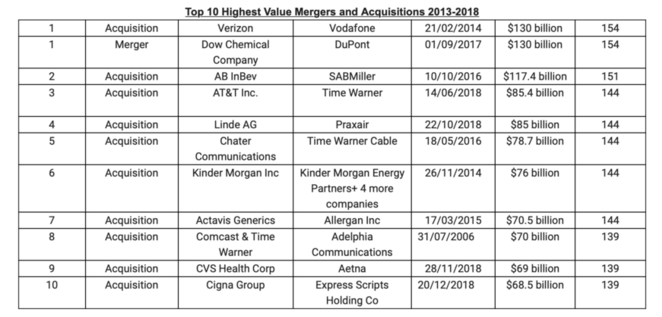The world of Mergers and Acquisitions can be fascinating, when it grabs financial headlines to broadcast the latest corporate “marriage” or at least the potential of one, barring any mishap with regulators and government officials that worry about anti-trust implications. Many of these mega-deals, just like many other relationships, can also end in “divorce”, hopefully, before the related share prizes fall through the floor. Analyzing these deals after the fact can provide insights, some more curious than others.
FXTM, the international forex broker specializing in forex trading, CFDs, stocks, commodities and spot metals, has recently taken a look at seventy of the largest M&A deals from 2013 through 2018 and made public a special “Mergers & Acquisition Index” that reveals stock prices, both before and one year after the deal, along with other insightful information.
The “Top Ten” on its list, or should we say eleven, since two companies tied for the top spot, is presented in the graphic below:
If you do the math, the total of these deals comes to just under $1 trillion or $980 billion, if you prefer to have the actual figure. The top two deals involved a corporate buy-out of a remaining stock holding from a prior deal and a mega-merger of two of the giants in the chemical industry. As the press release notes:
The highest-value M&As occurred in 2014 and 2017. Both valued at $130 billion, they surpassed the GDP of 154 countries or, put another way, 72 percent of African nations and the entirety of Central America.
Were these two deals successful? When Verizon bought out Vodafone’s remaining stock interest in the company in 2014, it was “the third-largest acquisition of any type in history and required the biggest corporate bond issuance on record. Verizon’s stock price at the time was $7.90 a share. A year later, it was nearly $49.00, a nice 519% return. Not to be outdone, the Dow/Dupont deal was very profitable on a short-term basis. The stock value rose from $5.11 to $69.72, a return that actually dwarfed Verizon’s stock performance. Are we to surmise that there is more money to be made in chemicals than in the telecommunications industry?
Nikola Grozdanovic, FXTM’s Head of Content, had this to say about his firm’s latest analysis project:
It’s been fascinating to analyse some of the world’s biggest mergers and acquisitions and visualise how their values compare to different countries’ GDP. What is interesting to see is how successful these M&As have been and whether the stock prices now reflect the overall worth of each deal. There are also some unexpected names on the list, with Google and Apple making some of the lowest value acquisitions in recent times.

